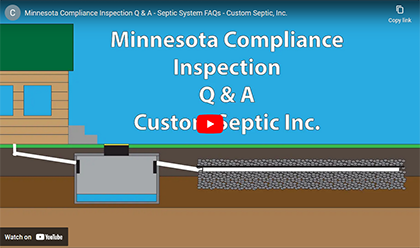The Need For Sewage System Compliance Inspection
For the overall health of your septic system and to ensure that your current Dayton MN septic sewage system is compliant with local and state regulations, you need to have a compliance inspection. A septic compliance inspection is an Inspection, Investigation or Evaluation to obtain a Certificate of Compliance (COC) or a Notice of Non-compliance (NON). An inspection is performed by a licensed septic system professional.
Compliance (COC) VS Non-Compliance (NON)
Your Certificate of Compliance (COC), designation certifies a system is in compliance at the time of inspection. A COC does not guarantee future hydraulic performance for increased flow or changes in use by current occupants. For an existing Subsurface Sewage Treatment System (SSTS), the Certificate of Compliance is good for 3 years.
A Notice of Non-compliance (NON), gives notice that a system has failed to be in compliance with state regulations. The two types of NON are an Imminent Threat to Public Health or Safety and Failing to Protect Ground Water. NON indicates the time frame for upgrade, repair, or replacement in accordance with local ordinances. In most of the State of Minnesota, ten months is given to comply.
Dayton MN Septic System Compliance Inspection Required
There are several situations where a compliance inspection is required. The City of Dayton, MN requires that all Subsurface Sewage Treatment Systems (SSTS) be inspected and pumped every 3 years. A Dayton septic system found to be in Non-compliance will be given the opportunity to have a licensed septic professional bring the SSTS into compliance.
The current Dayton MN regulation has a 3 Strikes rule in place for residences and business that do not comply. This is to protect the Environment and Threat to Humane Health.
Other Reasons For Septic Compliance Inspection
The State of Minnesota does not require a SSTS Compliance Inspection at the time of property transfer. However, many Local Government Units (LGUs) do require an inspection. Governing LGUs are Counties, Townships and Cities. An LGU may require a septic compliance inspection when a complaint is received, as part of a survey of an area, or for spills. Compliance inspections may also be requested by a Mortgage Lender, Real Estate Agent or Purchaser of Property.
More information can be found at the Minnesota Pollution Control Agency (MPCA) website at www.pca.state.mn.us/programs/ists
Who Can Do My SSTS Compliance Inspection? 
Only a Licensed Septic System Professional, such as Brad Krotzer at Custom Septic Inc. (CSI), can conduct a septic system compliance inspection for your Dayton MN property. He will be checking to see if your septic sewage system receives a Compliance (COC) or Notice of Non-compliance (NON). The COC is good for 3 years from the date of inspection.
Schedule An Appointment For A Compliance Inspection
Custom Septic Inc. (CSI) is Licensed, Bonded and Insured.



 Now Accepting Major Credit Cards!
Now Accepting Major Credit Cards!
